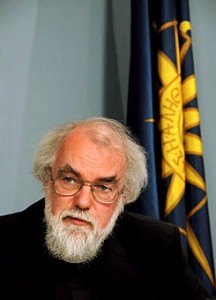Rowan Williams is stepping down as Archbishop of Canterbury at the end of this year, and has taken the opportunity to remove the muzzle and openly attack David Cameron’s idea of Great Britain’s “big society.” He calls it
aspirational waffle designed to conceal a deeply damaging withdrawal of the state from its responsibilities to the most vulnerable. And if the big society is anything better than a slogan looking increasingly threadbare as we look at our society reeling under the impact of public spending cuts, then discussion on this subject has got to take on board some of those issues about what it is to be a citizen and where it is that we most deeply and helpfully acquire the resources of civic identity and dignity.
This critical and prophetic language reminds us of the genuine role of the church in society. Williams’ attack is especially resonant amid the scandal of shameless interest rate rigging at Barclays in Great Britain and of similar fraud and collusion by investment bankers in the United States. For more on the Barclay scandal, go here. For Matt Taibbi’s scathing article in Rolling Stone–his disgust is palpable–go here.
Williams’ book Faith in the Public Square will by published by Bloomsbury this September. Go here for more details. Here are a few more nuggets:
At the individual and the national level, we have to question what we mean by growth writes. The ability to produce more and more consumer goods (not to mention financial products) is in itself an entirely mechanical measure of wealth. It sets up a vicious cycle in which it is necessary all the time to create new demand for goods and thus new demands on a limited material environment for energy sources and raw materials. By the hectic inflation of demand it creates personal anxiety and rivalry. By systematically depleting the resources of the planet, it systematically destroys the basis for long-term wellbeing. In a nutshell, it is investing in the wrong things.
‘Big society’ rhetoric is all too often heard by many as aspirational waffle designed to conceal a deeply damaging withdrawal of the state from its responsibilities to the most vulnerable.
The significance of trying to shape public opinion within the Church is something quite different from an institutional programme on the part of the Church to impose its vision on everybody else.
Religion is seen by those who find it unacceptable as essentially an appeal to the will – decide to obey these presuppositions and to obey these commands. Religion in fact is consistently against coercion and institutionalised inequality and is committed to serious public debate about common good.
These remarks bring to mind so many passages in Frye, but his discussion in “The Church: Its Relation to Society” (1949), written at the beginning of the Cold War, is particularly prescient. The managerial or oligarchic dictatorship he describes here perfectly applies to the world of resurgent capitalism and “permanent war” we have been living in for decades now, ever since the Reagan and Thatcher “revolutions”:
It should be realized that Protestantism, like Catholicism, has had to struggle with a sacrilegious parody of itself, a struggle far harder to get one’s bearings in than the other. This parody is best described as laissez-faire, the industrial anarchism which represents the doctrine of individual liberty transferred from the society of love to the society of power.
After benefiting greatly from capitalism as long as it was dissolving the concretions of feudal. authority, Protestantism was considerably baffled when it turned demonic with the Industrial Revolution. The uninhibited grabbing of corruptible possessions, conceived not as a perennial fact of human nature but as a programme of human action, is the first open defiance of law and Gospel in modern history, for even the revolutionary Deism which preceded it made moral ideals out of Christian conceptions. As Ruskin points out in his trenchant polemic Unto This Last, the merchant under laissez-faire, unlike professional men, has no “calling,” no antecedent social reason for his existence.`’ Hence he cannot make any sacrifice of his natural will. From this fact two fallacies designed to rationalize laissez-faire have originated. One which goes back to Rousseau, is the conception of the “rights of man” as identical with the natural will of man. The other is the conception of history as the working out of the will of the natural society. The latter is sometimes called social Darwinism, because it misapplies Darwin’s biological theory to history, and, presents us with a vision of historical progress through the survival of the fit, the fit being those who fit the progress of laissez-faire by the possession of an unusually strong lust for power and profits. These two major fallacies have spawned a fruitful brood of minor ones, which we should take care, in talking about “liberalism,” to distinguish from those which are essential to a coherent Christian outlook.
The defences of laissez-faire offered today usually assume that the political form of it is democracy. This is nonsense: its political form is an oligarchic dictatorship. Every amelioration of labour conditions, every limitation of the power of monopolies, every effort to make the oligarchy responsible to the community as a whole, has been forced out of laissez-faire by democracy, which has played a consistently revolutionary role against it. . . . The essential identity of interest between the tendency to dictatorship in America and the achievement of it in Russia has been stated, though with some distortion of emphasis, in James Burnham’s well known book, The Managerial Revolution. How such a revolution could make its power absolute and permanent by a not-too-lethal form of permanent war is shown with great clarity in George Orwell’s terrible satire 1984, perhaps the definitive contemporary vision of hell. (CW 4, 263-64)
